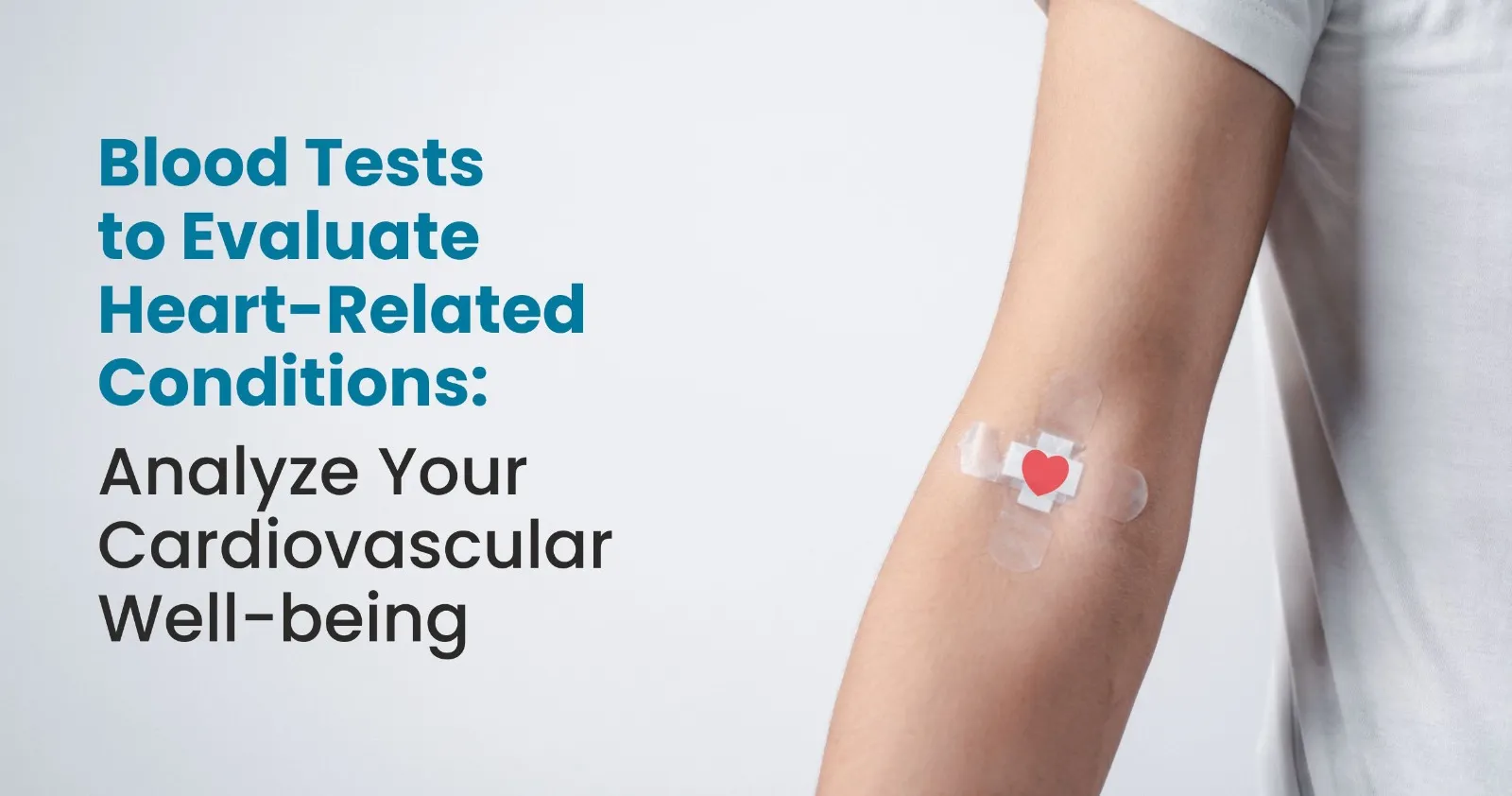Blood Tests to Evaluate Heart-Related Conditions: Analyse Your Cardiovascular Well-being
Sep 26, 2023

Shortness of breath, chest pain, and being drenched in sweat are the signs typically pinpointing to a heart attack. However, how can your doctor prove it or rule it out with something else? While imaging tests are available to give them clues, blood tests to evaluate heart-related conditions will provide the most accurate results about your cardiovascular well-being. Are you wondering what blood tests detect heart problems? Read on to find out!
Causes for Cardiovascular Disorders
Experts have manifested that poor cardiovascular health can contribute to several health ailments. However, what are the reasons that contribute to cardiovascular disorders? Here are some of the reasons:
- Medical history - There are high chances of developing the same condition if one of your parents or siblings was diagnosed with heart disease before age 60. Moreover, having diabetes, high blood pressure, and high cholesterol are some health conditions you can inherit and contribute to cardiovascular diseases.
- Smoking – Tobacco damages the blood vessels and decreases the blood flow to your heart. Research says even secondhand smoke could increase the risk of heart disease for non-smoking people.
- Diet – Eating foods rich in sugar, salt, and fat will increase the risk of heart disease.
- Exercise – Not engaging in exercise or being physically inactive in a sedentary lifestyle will weaken your heart muscles.
- Sleep – Poor or inadequate sleep will contribute to cardiovascular disorders and various factors, including obesity, diabetes, and high blood pressure.
Blood Tests to Evaluate the Heart-Related Conditions
A blood test for cardiovascular well-being is essential to stay healthy and updated about your well-being. Visiting your healthcare professional to get proper guidance and identify the risk of heart conditions is vital. There are several heart blood tests to diagnose and manage heart conditions, like:
1. Lipid Profile
A Lipid profile, or cholesterol test, is one of the preliminary blood tests to evaluate heart-related conditions. The test measures the level of fat content in the blood, indicating whether you risk developing stroke, heart attack, or any other cardiovascular disease. The test is carried out to detect the following four types of fats in your blood.
- Total cholesterol - It indicates the sum of the total cholesterol content in your body.
- Low-Density Lipoprotein Cholesterol (LDL) – LDL refers to the bad cholesterol in your blood. An excess level of LDL in the bloodstream will narrow your arteries and decrease the blood flow to your heart, eventually resulting in heart attack or stroke.
- High-density lipoprotein cholesterol (HDL) – HDL is the good cholesterol in your blood. It transports the LDL cholesterol away from the arteries, keeping them open and letting the blood flow freely.
- Triglycerides – It refers to a type of fat in your blood. High levels of triglycerides might be due to
 excess consumption of sugary drinks for foods, alcohol, smoking, or being obese.
excess consumption of sugary drinks for foods, alcohol, smoking, or being obese.
2. High-sensitivity C-reactive protein
C-reactive protein, or CRP, is a substance secreted by the liver and released into the bloodstream due to an inflammatory reaction. Inflammation happens at the initial stages of atherosclerosis. If the bloodstream shows a higher level of CRP, you are highly prone to heart attack and stroke. The test is especially carried out for women since they tend to have increased levels of CPR during episodes of heart attacks.
3. Troponin test
A troponin test is to determine the troponin level in your blood. Troponin is the type of protein present in the heart muscles but not in the blood. It is only transported to blood when there is damage to heart muscles. If a person has a high level of troponin in a blood test, it might indicate the onset of a heart attack.
Risk factors for Cardiovascular Disorders
Here is the list of risk factors that make individuals more prone to develop heart diseases:
- Age – Adults over 64 have a higher tendency to develop heart diseases.
- Obese or overweight - Extra weight or obesity is an invitation to all the problems, like high cholesterol, high blood pressure, and diabetes, which are connected to developing heart diseases.
- Gender – Older women are more susceptible to heart attack and related disorders than men. Men are highly prone to develop cardiovascular disease at a younger age than women.
- Heredity – An individual with a family history of heart disease is at higher risk of developing the same conditions. It means children of parents with heart diseases are likely to be affected.
When to Visit A Cardiologist?
Your heart beats more than 100,000 times daily. Hence, it is important to take preventive care. However, it isn't easy to know when to see a cardiologist. Here, we have listed out the reasons to visit the specialist.
- If you experience chest pain - It can be a sign that your heart is not receiving adequate blood flow.
- If you have high blood pressure/ diabetes - It will increase your risk of stroke and heart attack.
- If you have palpitations, dizziness, or shortness of breath - It could be a warning sign for coronary artery disease.
- If you have a history of smoking - It contributes to heart disease and cancer.
- If you are physically inactive and planning to start a new routine - It is essential to know the risk factors and to learn the safe exercise mode to avoid putting excessive pressure and strain on the heart.
Wrapping Up!
Your heart is the central hub of your entire body and should always be healthy. At Apollo Diagnostics, we provide the finest facilities to conduct tests that help in evaluating cardiovascular well-being. We stay at the forefront of medical services, delivering everyone the highest standard and comprehensive medical testing services. Visit our website today or locate a nearby Apollo Diagnostics Lab to get yourself tested today!
Frequently Asked Questions (FAQs)
Q1. Why is cardiovascular well-being important?
The cardiovascular system transports oxygen and nutrients in the blood throughout the body to enable proper functions. Hence, taking care of your heart health with healthy lifestyle choices and regular check-ups is important.
Q2. Is it possible to detect every heart problem through blood tests?
Blood tests will help healthcare professionals understand your risk of developing heart-related disorders. However, blood tests alone cannot act as a definite diagnosis to detect all cardiovascular problems.
Q3. What is the best blood test procedure to detect heart failure?
The BNP (B-type natriuretic peptide) test is the key to diagnosing heart failure. It will measure the level of BNP in your blood, which indicates the functioning of your heart. The higher the BNP amount, the higher the risk for heart failure.
Related Blog Post
Blog Categories
- Child Health
- Mens Health
- Women's Health
- Mental Health
- Health Myths & Facts
- Fitness
- Nutrition/Recipes
- Remedies
- Weight Management
- Stress Management
- Health Supplements
- Addiction Management
- Disease Management
- Allergy
- Anemia
- Arthritis
- Asthma
- Autoimmune Diseases
- Blood Pressure
- Cancer
- Deficiencies
- Dengue/Malaria/Chikungunya
- Diabetes
- Eye Problems
- Heart Diseases
- Hepatitis
- HIV/AIDS/STD
- Hormonal Imbalance
- Infection/Flu/Viral
- Kidney
- Liver
- Menstrual Problems
- Pregnancy
- Skin & Hair Problems
- Stomach Ailments
- Thyroid
- Others
- Health Checkups
- Diagnostics/Pathology
- Lifestyle & Wellness
- Covid
- Medical Tests
- Cholesterol
- Health Tips
- Parent Care/Old Age
- Lungs
- Food Intolerance








